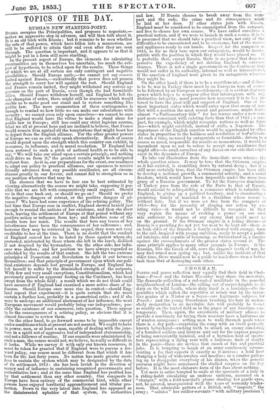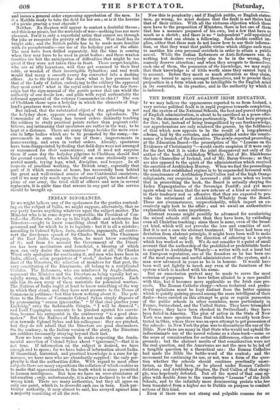CROBHAM.
SATIRE and grave reflection may equally find their field in Chob- ham—P tench and the future Macaulay may share the materials. The dramatic collection of a red-coated multitude in the peaceful neighbourhood of London—the calling out of carpet-knights to do duty on the wild heath, where duty itself is a hardship—the in- genuities which soften the asperities of mimic war by the inven- tive genius of a Minter or a Soyer—are legitimate subjects for ,Punch; and the young Guardsman brushing his hair in melan- choly resignation to an inevitable fate will probably be found as readily on the tented field as in the pages of our facetious con- temporary. Then, again, the expedients of military officers to provide a machinery for trying their warriors have a ludicrous air of wanton annoyance : setting men to walk through pools m hen there is a dry path—surprising the camp with an event perfectly known beforehand—rushing forth to attack an enemy consisting of a hundred soldiers and farriers sent out for the express purpose of being conveniently inimical, and of a harmless host of specta- tors representing a flying rout with a ludicrous dash of reality in the panic—these are devices that smack of fun and practical joke. It is tempting to laugh at an army cumbrously circum- venting a foe that expects it exactly as it arrives ; a bold host charging a body of wide-awakes and muslins ; or a courier gallop- ing up to disappoint everybody of his dinner, when the general postman might have announced the studied surprise on the day before. It is the most elaborate form of the fuss about nothing.
Yet more is satire tempted to smile at the spectacle of a lady in a riding-habit simulating an undress uniform, mounted on a "charger," with a field-marshal's plume shading her gentle eyes, not, be assured, unacquainted with the tears of womanly tender- ness. That admirable pattern of a British wife " inspects " the army; " salutes " her soldier-servants "with military precision "; and issues a general order expressing approbation of the men. Is it a Matilda ready to take the field for her son ; or is it the heroine of a picnic gracing a vast charade ? Neither. No Stephen will appear to contest a doubtful throne ; and this is no picnic, but the materials of war—nothing less nor more pleasant. For it is only a superficial satire that cannot see through the joke or recognize the gravity of the duties. War itself has its bright side ; and the British public has to be made more familiar with its paraphernalia—one use of the holyday part of the affair. The men have been drilled separately, but the time is coming when they may have to be used in great bodies; • and these wanton troubles are but the anticipation of difficulties that might be too great if they were not taken thus in front. Those carpet-knights, who are so idly luxurious, will thus get seasoned to their first colds, or weeded of their incorrigible Sybarites ; and real work would find many a smooth young fop converted into a dashing officer. As to the Queen of the show, what is her presence but that of the Lady of ladies, embodying to the soldiery the approval they most covet ? what is the royal order issued by the fair Sove- reign but the sign-manual of the gentle power that can wield the authority of our docile law, and gilds with royal authenticity the informed approval of the veteran Commander-in-chief ? The sun of Chobham shone upon a holyday in which the elements of Eng- land's greatness were reviewed. But indeed, that the substantial object of the gathering is not the holyday show, appears even through the splendours. The Commander of the Camp has issued orders distinctly teaching the soldiers to study practical points rather than pageant exhi- bitions, and intimating that spectators are rather in the way, to be kept at a distance. There are many things besides the mere exer- cise in liege bodies which are to be promoted by the camp,—im- provements in arms and the use of them ; improvements in manceuvering, and even in verbal orders. Already, spectators have been disappointed by finding that field-days were not arranged or announced for their convenience ; and it need not surprise them if some day the holyday pilgrims to Chobham should find the ground vacant, the whole body off on some studiously unex- pected march, trying legs, wind, discipline, and temper. In all respects of practical working, the British army, especially that part of it which remains at home, has necessarily been behind the great and well-trained armies of our Continental emulators ; and if we may rely much upon the national spirit; the noted disci- pline of our army, the tried skill of officers and men in several regiments, it is quite time that arrears in any part of the service should be brought up.



























 Previous page
Previous page